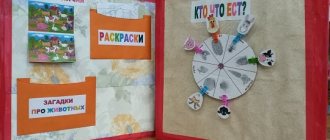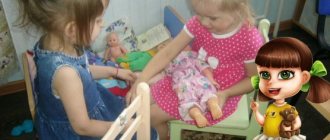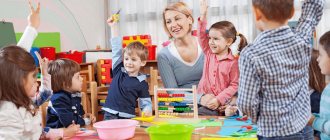What is social development
What does the term “social development” (or “socialization”) mean? This is a process in which a child adopts the traditions, values, and culture of the society in which he will live and develop. That is, the baby undergoes the basic formation of his initial culture. Social development is carried out through communication with peers and adults. When communicating, the child begins to live by the rules, trying to take into account his interests and interlocutors, and adopts specific behavioral norms. The environment surrounding the baby, which also directly influences his development, is not just the outside world with streets, houses, roads, objects. The environment is, first of all, people who interact with each other according to certain rules that prevail in society. Any person who meets a child’s path brings something new into his life, thus directly or indirectly shaping him. The adult demonstrates knowledge, skills and abilities regarding how to interact with people and objects. The child, in turn, inherits what he sees and copies it. Using this experience, children learn to communicate in their own little world with each other.
It is known that individuals are not born, but become. And the formation of a fully developed personality is greatly influenced by communication with people. That is why parents should pay enough attention to developing a child’s ability to find contact with other people.
In the video, the teacher shares his experience of socializing preschoolers
“Did you know that the main (and first) source of a child’s communicative experience is his family, which is a “guide” to the world of knowledge, values, traditions and experience of modern society. It is from parents that you can learn the rules of communication with peers and learn to communicate freely. A positive socio-psychological climate in the family, a warm homely atmosphere of love, trust and mutual understanding will help the child adapt to life and feel confident.”
Psychological and pedagogical features of the development of communication skills in preschool children
First of all, it should be noted that communication is the most important condition and factor in the mental development of a child. This idea was first presented by Ya.S. Vygotsky. He argued that “the psychological nature of man is the totality of human relationships that are transferred inward and become functions of the personality and forms of its structure.” [6, p. 146]. In addition, the scientist pointed out the importance of the interconnection and interdependence of the “child-child” and “child-adult” relationships for the development of the child: “A child is able to do much more through imitation in collective activities under the guidance of adults, and with understanding - to do independently” [ 6]. Numerous studies by domestic psychologists and teachers (B.G. Ananyev, A.V. Zaporozhets, A.N. Leontyev, N.S. Leites, etc.) make it possible to clarify that preschool age is a sensitive period in the development of communication. At this age, one of the most important changes in a child’s communicative development occurs—their circle of contacts expands. If at first the child communicated only with adults, now he begins to communicate with peers. The child’s attitude towards other children changes, he understands that they are “the same as himself”, and the so-called “identification with peers” occurs. Thus, the child and his peers in preschool age enter a common communicative space [14]. Communication, in turn, requires that people understand each other. But small children are self-centered. They think that others think, feel, see the situation the same way as they do. Therefore, it is difficult for them to put themselves in the place of another person, to put themselves in their place. It should be noted that it is even more difficult for an older preschooler not only to understand the problems of another person, to imagine his experiences, but also to respond emotionally to them. This sometimes explains the cruelty of a child torturing an animal, and the low effectiveness of an adult’s words: “Leave the cat alone, you’re hurting it.” In the same way, a small child cannot always understand the resentment and pain of another person. Gradually, based on communication experience, children develop social sensitivity, that is, the ability to take into account the feelings and desires of other people, the reasons for their actions. Only in this case can special relationships develop between people, expressed in mutual sympathy, friendship, love (D.B. Elkonin, L.S. Vygotsky, L.I. Bozhovich, A.V. Zaporozhets, L.A. Wenger, A.A. Lyublinskaya, V.S. Mukhina, Yu.A. Kolomensky, N.N. Poddyakov and others). Last but not least, an important element of quality communication is understanding how your partner perceives you. It is precisely this lack of understanding that people have about each other that usually causes conflicts. It is especially difficult for young children, which is why quarrels, arguments and even fights often occur between them. At the same time, it is necessary to emphasize that regardless of the form of communication a child has with the people around him, expression remains a necessary means of communication. Emotional communication modifies all forms of communication, permeates and colors them, plays a big role in the formation of a child’s emotional and value-based attitude towards people, his understanding and development of his own means of expression to others.
Stages of child social development
- Infancy. Social development begins in a preschooler in infancy. With the help of a mother or another person who often spends time with the newborn, the baby learns the basics of communication, using means of communication such as facial expressions and movements, as well as sounds.
- From six months to two years. The child’s communication with adults becomes situational, which manifests itself in the form of practical interaction. A child often needs the help of his parents, some kind of joint action for which he turns.
- Three years. At this age, the baby already demands society: he wants to communicate in a group of peers. The child enters the children's environment, adapts to it, accepts its norms and rules, and parents actively help with this. They tell the preschooler what to do and what not to do: whether it is worth taking other people’s toys, whether it is good to be greedy, whether it is necessary to share, whether it is possible to offend children, how to be patient and polite, and so on.
- From four to five years. This age period is characterized by the fact that children begin to ask an infinite number of questions about everything in the world (to which adults do not always have answers!). A preschooler’s communication becomes brightly emotionally charged and aimed at cognition. The baby’s speech becomes the main way of his communication: using it, he exchanges information and discusses the phenomena of the surrounding world with adults.
- From six to seven years. The child’s communication takes on a personal form. At this age, children are already interested in questions about the essence of man. This period is considered the most important in the development of the child’s personality and citizenship. A preschooler needs an explanation of many life moments, advice, support and understanding from adults, because they are role models. Looking at adults, six-year-olds copy their style of communication, relationships with other people, and the characteristics of their behavior. This is the beginning of the formation of your individuality.
Social development in kindergarten
How does kindergarten influence the successful socialization of a child?
In kindergarten:
- a special socially formative environment has been created
- organized communication with children and adults
- organized play, work and educational activities
- civil-patriotic orientation is being implemented
- organized interaction with family
- the principles of social partnership have been introduced.
The presence of these aspects predetermines a positive impact on the child’s socialization.
There is an opinion that going to kindergarten is not at all necessary. However, in addition to general developmental activities and preparation for school, a child who goes to kindergarten also develops socially. In kindergarten, all conditions have been created for this:
- zoning
- gaming and educational equipment
- games
- didactic and teaching aids
- presence of children's group
- communication with adults.
All these conditions simultaneously involve preschoolers in intensive cognitive and creative activities, which ensure their social development, form communication skills and the formation of their socially significant personal characteristics.
It will not be easy for a child who does not attend kindergarten to organize a combination of all of the above developmental factors.
Social education of a preschooler
Social education is the basis of social development. It is in preschool age that a system of relationships between children and adults is formed, the types of children’s activities become more complex, and the joint activities of children are formed.
In early childhood, children learn a wide range of actions with objects, they discover ways of using and using these objects. This “discovery” leads the child to an adult as the bearer of the way to perform these actions. And the adult also becomes a model with which the child compares himself, whom he inherits, and repeats his actions. Boys and girls carefully study the world of adults, highlighting the relationships between them and ways of interaction.
The social education of a preschooler is the comprehension of the world of human relations, the child’s discovery of the laws of interaction between people, that is, norms of behavior. The desire of a preschooler to become an adult and growing up lies in the subordination of his actions to the norms and rules of behavior of adults accepted in society.
Since the leading activity of a preschooler is play, role-playing play becomes the main one in the formation of the child’s social behavior. Thanks to this game, kids model the behavior and relationships of adults. At the same time, in the foreground for children are relationships between people and the meaning of their work. By fulfilling certain roles in the game, boys and girls learn to act, subordinating their behavior to moral standards. For example, children often play hospital. They take on the roles of patient and doctor. Moreover, the role of a doctor is always more competitive, since it has the function of recovery and assistance. In this game, kids inherit the behavior of the doctor, his actions with a phonendoscope, examining the throat, syringes, and writing a prescription. Playing hospital strengthens the relationship of mutual respect between the doctor and the patient, the implementation of his recommendations and appointments. Typically, children inherit the behavior pattern of the doctors they visited in the clinic or their local pediatricians.
If you watch children in the role-playing game “Family” or, as the kids say, “like dad and mom,” you can find out what kind of atmosphere reigns in the family of each of them. Thus, the child will subconsciously take on the role of leader in the family. If this is dad, then even girls can be dad, go to work, and then “go to the garage to repair the car.” They can instruct their “half” to buy something in the store or cook their favorite dish. At the same time, children’s play can also reveal the moral climate and relationships between parents. This is a kiss from parents before leaving for work, an offer to lie down after work and relax, the tone of communication is orderly or affectionate. A child’s copying of parents’ standards of behavior indicates that it is they who form the child’s pattern of family relationships. Equality will be either submission, mutual respect or dictate - it depends on the parents. They must remember this every minute.
Social education of a preschooler is the formation of humanistic feelings and relationships. For example, attention to the interests of other people, their needs, interest in their work, respect for any profession. This is the ability of a boy and a girl to sympathize with troubles and rejoice in the joys of others. Today this is very important, since envy often develops in children already in preschool age. And this is precisely the inability to be happy for one’s neighbor, which, as the child grows up, develops into duplicity and chameleonism, the predominance of material values over moral ones. Social education is also the child’s ability to experience his guilt for violating generally accepted norms of behavior. For example, a boy should feel remorse for taking away a car from a peer, he should ask for forgiveness for the offense. The girl should worry about the damaged doll. She must understand that toys cannot be damaged; they should be treated with care, as with all things, objects, and clothing.
Social education of preschoolers is the ability to live in a group of peers, respect for adults, compliance with norms of behavior in public places, outdoors, and at a party.




